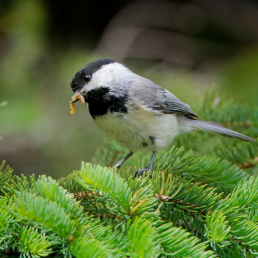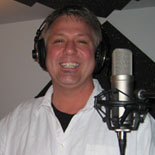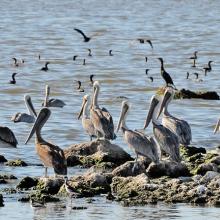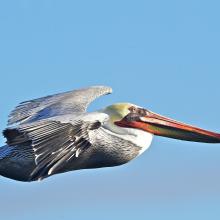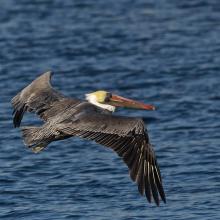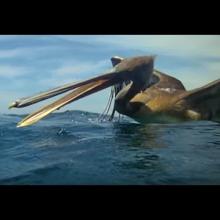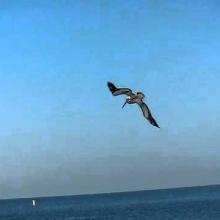

Join BirdNote tomorrow, November 30th!
Illustrator David Sibley and actor H. Jon Benjamin will face off in the bird illustration battle of the century during BirdNote's Year-end Celebration and Auction!
During the winter of 2009-2010, thousands of Brown Pelicans washed ashore on Pacific beaches, wet, cold, starving. Fierce storms, thought to be more frequent because of global climate change, probably made it difficult for the birds to feed. And storm-water runoff washed oil and pollutants into the water, destroying the birds' natural insulation. Perhaps carpooling and using your car less can benefit birds like pelicans, which are on the receiving end of oil-based pollution.
BirdNote®
Brown Pelicans - What We're Learning
Written by Dennis Paulson
This is BirdNote.
[Waves crashing on shore]
Brown Pelicans are a conservation success story. Through the 1960s, their numbers plummeted. Because they ingested byproducts of the pesticide DDT, pelicans laid eggs with shells so thin they broke during incubation. But after DDT was banned in 1972, the birds recovered almost miraculously. In 2009, they were removed from the Endangered Species List.
[Brown Pelican vocalizations]
The nesting colonies along our southern coasts have returned, and all seemed well with the species. But this winter, thousands of pelicans washed ashore on Pacific coast beaches, from Portland to San Diego. [TV news account] They were bedraggled, wet, cold, and starving. Rehabilitation centers saved the lives of many, but many pelicans died.
[Whistling wind]
Some of these "wrecks," as they are called, were caused by fierce Pacific storms, thought to be more frequent because of global climate change. High winds and waves surely prevented Brown Pelicans from feeding, and storm-water runoff washed oil and pollutants into the water, which destroyed the pelicans' natural insulation. DDT is no longer used in the US, but many other threats to the birds remain.
[Waves crashing on shore, wind sounds]
It might seem an unlikely link at first, but carpooling and using your car less can benefit birds like pelicans, which are on the receiving end of oil-based pollution.
For BirdNote, I’m Michael Stein.
###
Call of the Brown Pelicans provided by The Macaulay Library at the Cornell Lab of Ornithology, Ithaca, New York recorded by T.A. Parker. Splash of the Brown Pelican recorded by W.W. H. Gunn.
News account re Brown Pelicans at International Bird Rescue Research Center; KTUV Sausalito
Producer: John Kessler
Executive Producer: Chris Peterson
© 2012 Tune In to Nature.org April 2012 Narrator: Michael Stein
ID# BRPE-03-2010-04-09-MS
